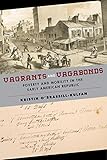Vagrants and Vagabonds : Poverty and Mobility in the Early American Republic / Kristin O'Brassill-Kulfan.
Material type: TextSeries: Early American Places ; 7Publisher: New York, NY : New York University Press, [2019]Copyright date: ©2019Description: 1 online resource : 12 black and white illustrationsContent type:
TextSeries: Early American Places ; 7Publisher: New York, NY : New York University Press, [2019]Copyright date: ©2019Description: 1 online resource : 12 black and white illustrationsContent type: - 9781479845255
- 9781479833207
- 305.5/692097309034
- HV4505 .O373 2019
- online - DeGruyter
| Item type | Current library | Call number | URL | Status | Notes | Barcode | |
|---|---|---|---|---|---|---|---|
 eBook
eBook
|
Biblioteca "Angelicum" Pont. Univ. S.Tommaso d'Aquino Nuvola online | online - DeGruyter (Browse shelf(Opens below)) | Online access | Not for loan (Accesso limitato) | Accesso per gli utenti autorizzati / Access for authorized users | (dgr)9781479833207 |
restricted access online access with authorization star
http://purl.org/coar/access_right/c_16ec
The riveting story of control over the mobility of poor migrants, and how their movements shaped current perceptions of class and status in the United States Vagrants. Vagabonds. Hoboes. Identified by myriad names, the homeless and geographically mobile have been with us since the earliest periods of recorded history. In the early days of the United States, these poor migrants - consisting of everyone from work-seekers to runaway slaves - populated the roads and streets of major cities and towns. These individuals were a part of a social class whose geographical movements broke settlement laws, penal codes, and welfare policies. This book documents their travels and experiences across the Atlantic world, excavating their life stories from the records of criminal justice systems and relief organizations. Vagrants and Vagabonds examines the subsistence activities of the mobile poor, from migration to wage labor to petty theft, and how local and state municipal authorities criminalized these activities, prompting extensive punishment. Kristin O'Brassill-Kulfan examines the intertwined legal constructions, experiences, and responses to these so-called "vagrants," arguing that we can glean important insights about poverty and class in this period by paying careful attention to mobility. This book charts why and how the itinerant poor were subject to imprisonment and forced migration, and considers the relationship between race and the right to movement and residence in the antebellum US. Ultimately, Vagrants and Vagabonds argues that poor migrants, the laws designed to curtail their movements, and the people charged with managing them, were central to shaping everything from the role of the state to contemporary conceptions of community to class and labor status, the spread of disease, and punishment in the early American republic.
Mode of access: Internet via World Wide Web.
In English.
Description based on online resource; title from PDF title page (publisher's Web site, viewed 01. Nov 2023)


